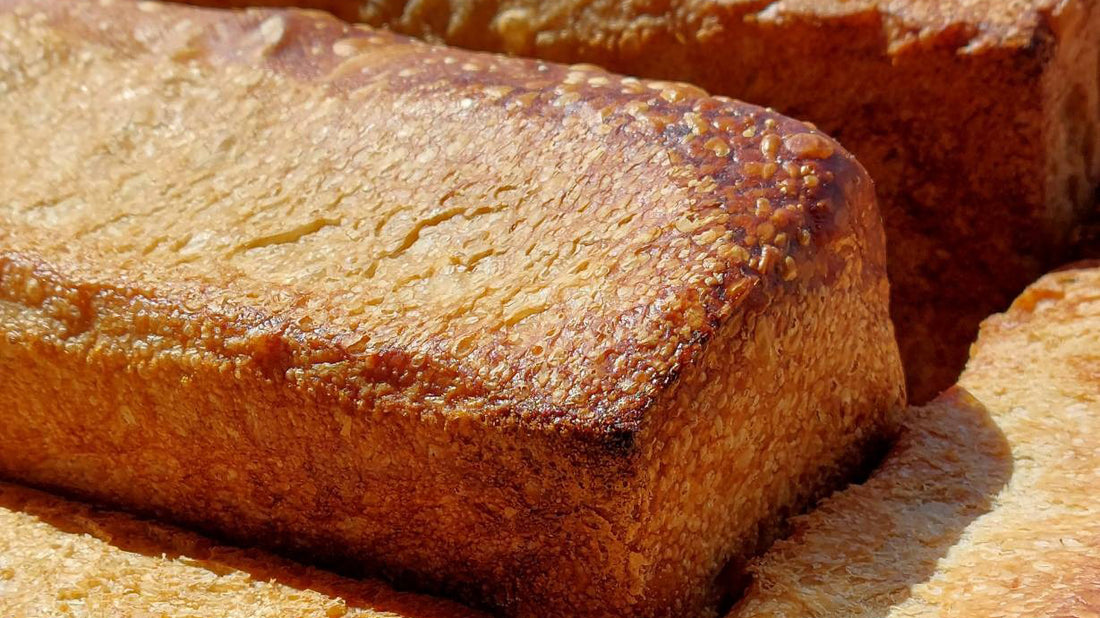
Why do we only bake bread in tins? A technical approach for energy saving.
Share
In Bakery de Stefano you will only find bread cooked in rectangular tins.
This choice has been carefully planned and at the time of writing we make two kinds of breads:
Both breads are simply sourdoughs cooked in rectangular metal tins.
It is a small production but bread is sold out on a daily basis. Often you need at least 2 days for a reservation so we believe we are giving a good product to our customers seen its popularity.
Throughout my career I always baked the traditional round sourdough breads we are used to, the nice ones with an opened lip on top.
Then the war between Russia and Ukraine happened and energy/ingredients prices skyrocketed.
Energy has never been cheap for bakeries who usually need at least 25 KW in their venues to have an oven plus multiple machines running at the same time.
But lately (2022) energy prices have doubled in the Canary Islands, and quadrupled in other countries (like Italy).
Many food companies are going out of business for the unsustainable energy bills, and those that survive are trying to adapt as best as they can to the following big question:
“How can we consume less power and still deliver great products that our customers are willing to buy?”
Let’s consider a small bakery oven, just like the one in Bakery de Stefano.
There are two stone ovens, one on top of each other, that can fit 4 trays 60x40cm in total, so the chamber is 80cm wide and 60cm large.
If we consider only one cooking chamber we can cook the following combinations:
This is a classical setup for such chambers if we want an optimal bread development. We all know that placing bread too close to each other leads to imperfections.
By cooking breads in metal tins we are able to increase our cooking capacity as follows:
As you can see it is a bump of 66% capacity for the 1000g loaves and 75% capacity in the 500g loaves.
At the time of writing we decided to convert all our production to 500g loaves for the following reasons:
This choice has been carefully planned and at the time of writing we make two kinds of breads:
- a 500g wholewheat sourdough loaf with six seeds
- a 500g sourdough loaf with rye and spelt flours
Both breads are simply sourdoughs cooked in rectangular metal tins.
It is a small production but bread is sold out on a daily basis. Often you need at least 2 days for a reservation so we believe we are giving a good product to our customers seen its popularity.
Throughout my career I always baked the traditional round sourdough breads we are used to, the nice ones with an opened lip on top.
Then the war between Russia and Ukraine happened and energy/ingredients prices skyrocketed.
Energy has never been cheap for bakeries who usually need at least 25 KW in their venues to have an oven plus multiple machines running at the same time.
But lately (2022) energy prices have doubled in the Canary Islands, and quadrupled in other countries (like Italy).
Many food companies are going out of business for the unsustainable energy bills, and those that survive are trying to adapt as best as they can to the following big question:
“How can we consume less power and still deliver great products that our customers are willing to buy?”
Let’s consider a small bakery oven, just like the one in Bakery de Stefano.
There are two stone ovens, one on top of each other, that can fit 4 trays 60x40cm in total, so the chamber is 80cm wide and 60cm large.
If we consider only one cooking chamber we can cook the following combinations:
- 6 1000g classical sourdough loaves
- 8 500g classical sourdough loaves
This is a classical setup for such chambers if we want an optimal bread development. We all know that placing bread too close to each other leads to imperfections.
By cooking breads in metal tins we are able to increase our cooking capacity as follows:
- 10 1000g sourdough in tins
- 14 500g sourdough in tins
As you can see it is a bump of 66% capacity for the 1000g loaves and 75% capacity in the 500g loaves.
At the time of writing we decided to convert all our production to 500g loaves for the following reasons:
- It optimizes cooking times
- It optimizes the cooking chamber
- The 500g loaves are easier to cut compared to the 1000g ones
- The 500g loaves need less cooling time before selling
- The 500g loaves allow customers to have fresh bread more often
- Small slices are easier to heat and fit commercial toasters
We understand a change in bread shape might seem outrageous for some bakers but in times of inflation hard choices must be made, and we prefer to change shapes instead of lowering product quality.
Every morning when bread starts cooking a wonderful smell of sourdough comes out from the oven and people walking the streets turn towards Bakery de Stefano. They stare at the window and point at the first loaves that come out from the oven.
A wonderful natural light shines on our products while we wait to open the doors to give warm bread to our customers.
A new day has started, with a smile.
Flavio de Stefano